Once seated, peruse the Experience menu in front of you and you’ll be intrigued by what’s to come. Razor clams finished with a delicately salty catfish garum. Baby squid cooked in yeasted butter and served with a funky broth made with fermented tea leaves from Chiang Mai. Rock lobster fermented in shio koji served with kumquat kosho. Grilled breast of local duck brushed with sourdough mirin, surrounded by grilled local vegetables.
PROFILE
An Immersion in Fermentation
04 Sep 2023
At InterContinental Phuket’s fine dining restaurant, hom, Chef Ricardo Nunes and team are unlocking flavor profiles of locally sourced ingredients through various fermentation methods, resulting in creative and inventive dishes worth flying in for.
Walking to the Sawan Pavilion located within the expansive grounds of InterContinental Phuket is a dramatic affair. Pass through the glittery, mirrored pathway to make your way to the majestic white structure. Walk up the steps and through the towering double doors and you’ll enter the world of hom, where Chef Ricardo Nunes and team are transforming local, sometimes humble, Thai ingredients into fine dining-worthy dishes through a variety of fermentation methods and fine dining techniques.

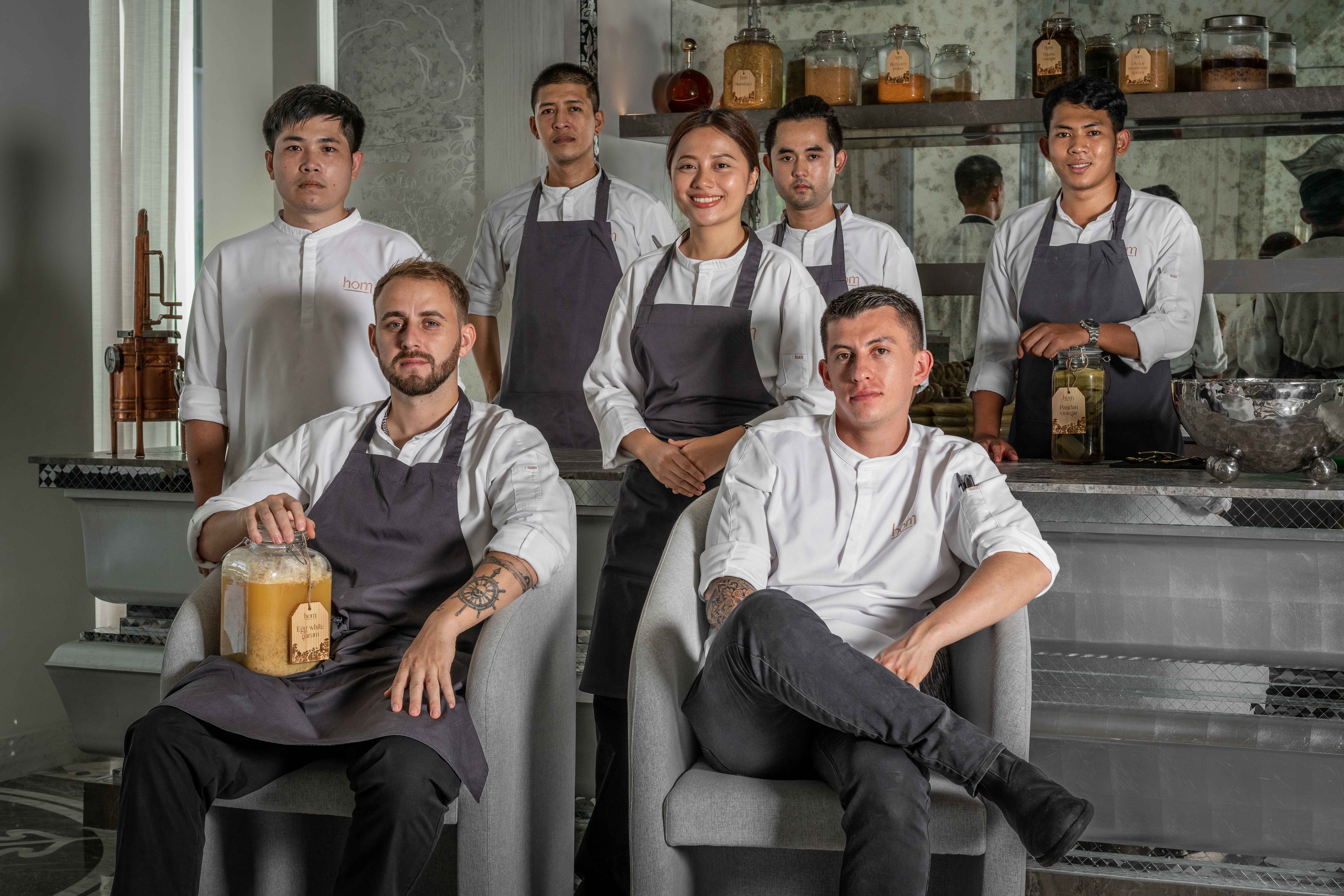 Chef Ricardo Nunes and the team at hom
Chef Ricardo Nunes and the team at hom
“Fermentation is used as a means to maximize flavors and elevate ingredients within each dish,” explains Nunes. “I certainly wouldn’t say that fermentation is your everyday cooking skill. In fact, I have personally been studying fermentation for many years now, and yet, I am still learning new things each day,” reveals the chef who has also worked at fine dining establishments like Potong, Belcanto, and Ikoyi. “It’s very experiential, as you need to understand the fat ratio of certain products to determine what the fermentation process will look like. Thus, it’s a never-ending experimentation in the hom kitchen, as we learn to work with new ingredients.”
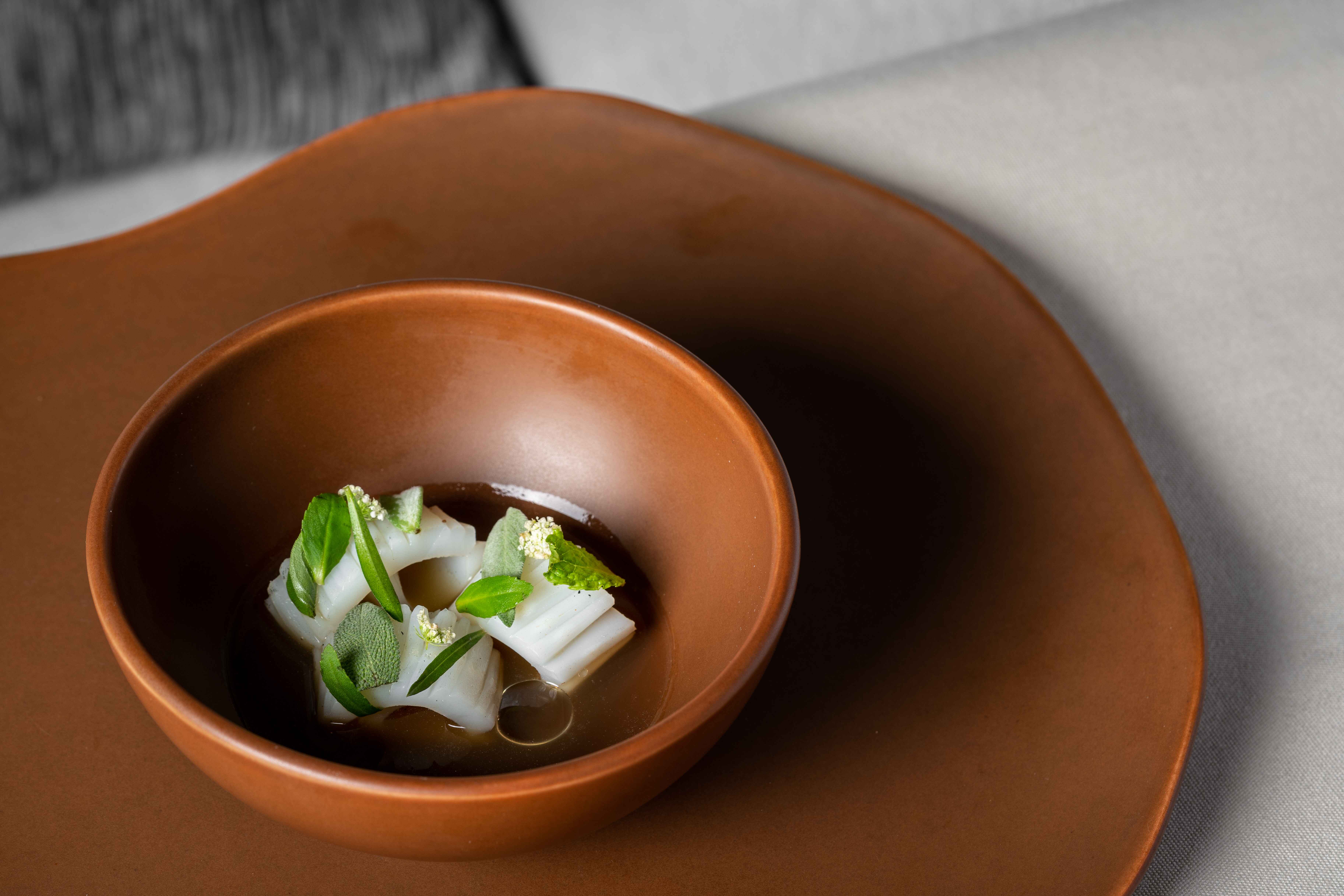 Baby squid, tea leaves
Baby squid, tea leaves
How did the idea of hom come to life? Can you walk us through the experience of bringing all the elements together?
The idea of hom came to life when we discovered the Sawan Pavilion as our location. Inspired by this magnificent destination, we embarked on a mission to create a fine dining concept that harmonized with the venue's charm.
From the start, we aimed to deliver fine dining with a focus on locavorism, leveraging the diverse produce available in Phuket. Collaborative brainstorming sessions played a pivotal role, as we explored innovative ways to present local products in an exciting manner. The concept of fermentation emerged as a key element, allowing us to elevate specific ingredients and present them in unique and unexpected ways.
The process of creating the hom menus began with an inventory of accessible Phuket ingredients. From there, we embarked on a collaborative journey, meticulously examining each ingredient's potential in dishes and discussing the most intriguing options. Delving deeper, we experimented with fermentation techniques to enhance flavors, exemplified by our Wild Boar course, where the boar is fermented with barley koji and black durian paste, imparting unparalleled richness without the need for additional salt.
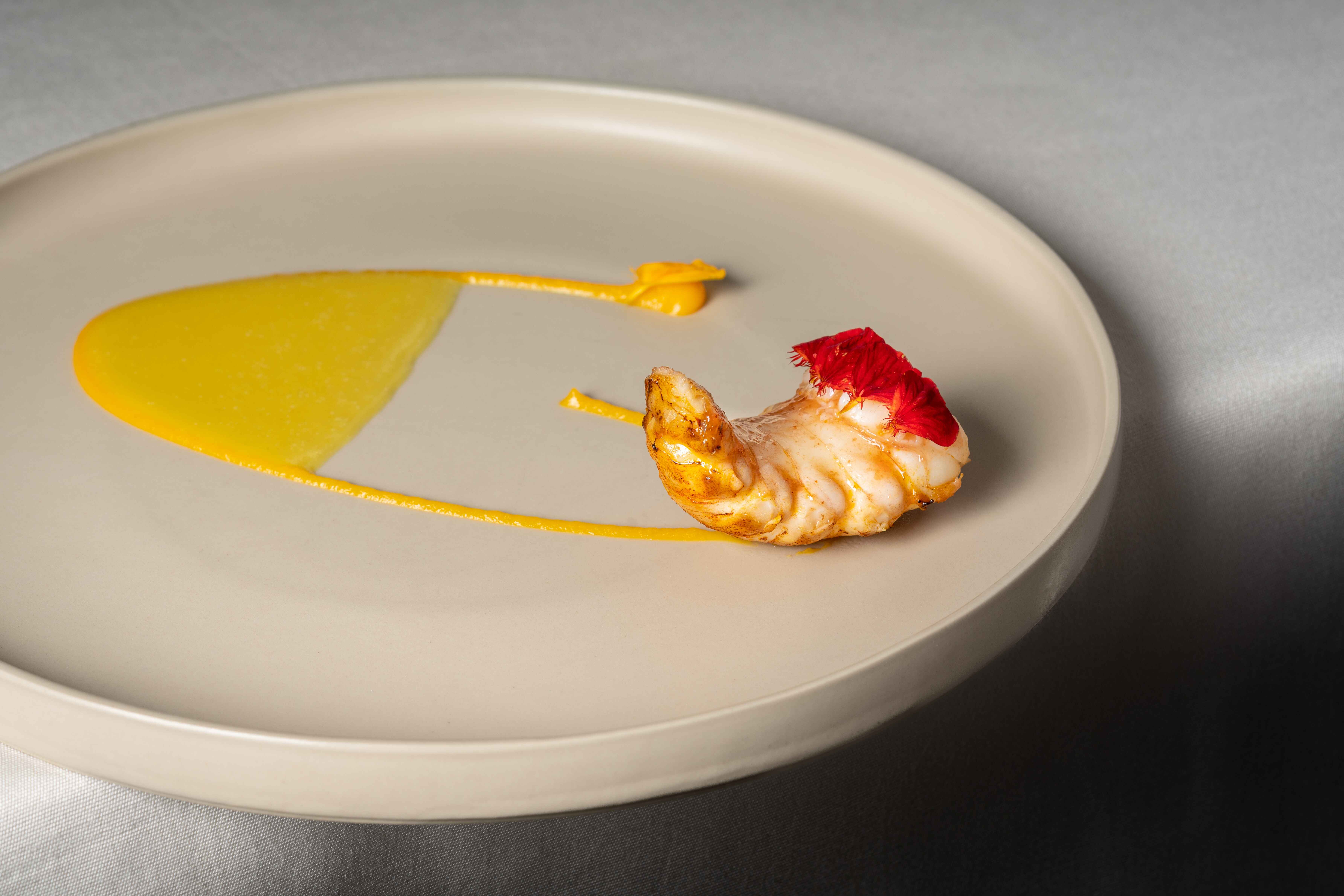 Rock lobster, kumquat kosho
Rock lobster, kumquat kosho
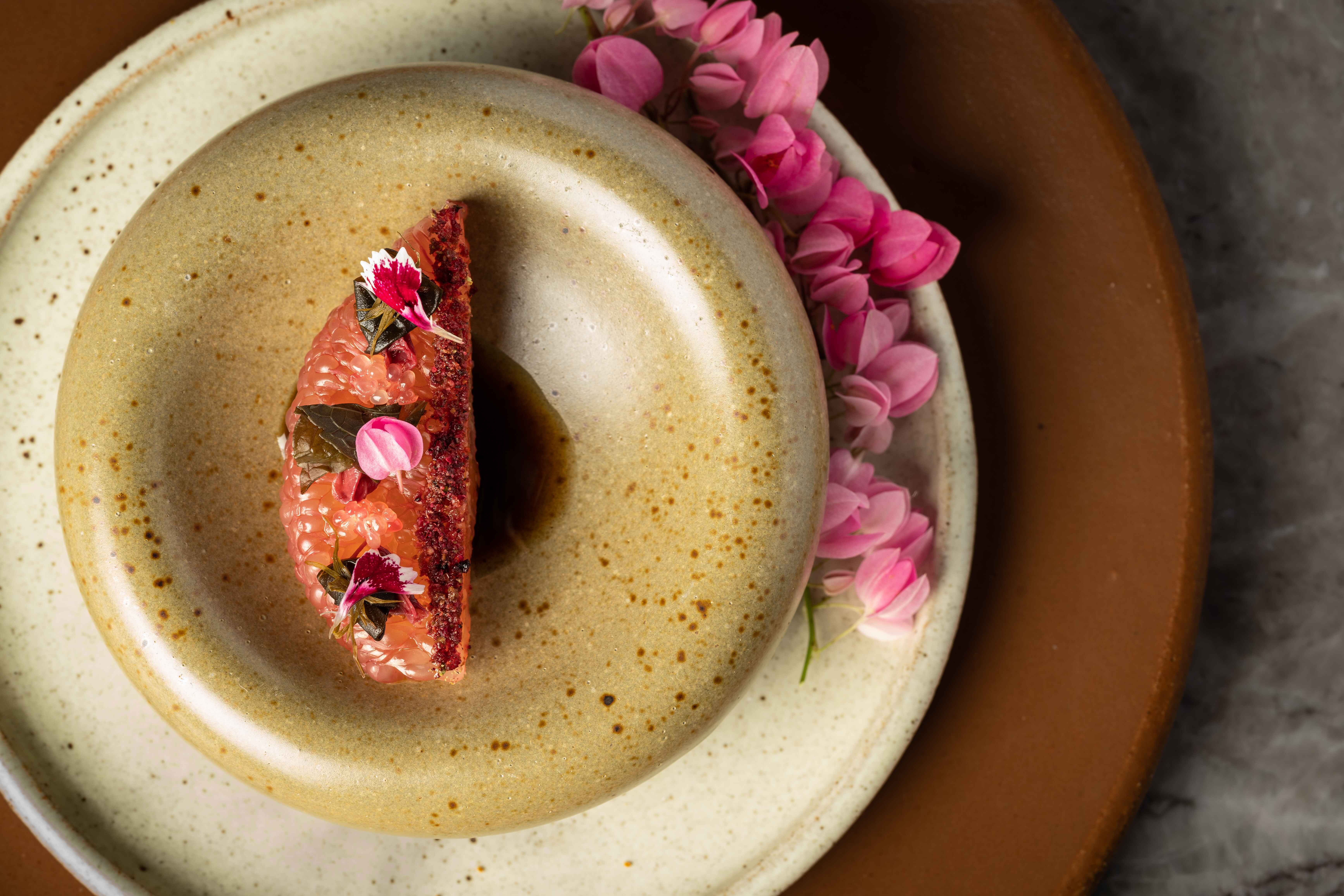 Fermented passionfruit and ruby pomelo
Fermented passionfruit and ruby pomelo
What are the most important food lessons you’ve learned while living and working in Thailand? In addition to using locally sourced ingredients, how does Thai gastronomy come into play at hom?
While living and working in Thailand, I've learned the importance of locavorism and building strong relationships with local farmers and suppliers. Embracing locavorism has allowed us to source almost all of our ingredients from Phuket itself, creating a tight-knit community of suppliers who feel like an extended family.
Thai gastronomy plays a significant role at hom as we integrate Thai culinary traditions with our concept of fermentation and exploration. While not everything on our menu is fermented, we carefully select specific ingredients to incorporate fermentation, elevating the flavors in each dish. Our focus on discovery and exploration, alongside the celebration of amazing local ingredients, resonates with Thai gastronomy, where bold flavors, fresh produce, and creativity are at the heart of culinary culture.
Why is there such a strong emphasis on fermentation at hom? Does the culture of fermenting/fermentation play a big role in how people eat in Phuket/Thailand?
Fermentation holds a strong emphasis at hom as it fascinates and inspires us to create unique and flavorful dishes. The process of fermentation serves as a means to maximize flavors and elevate the ingredients we use. While fermentation is not an everyday cooking skill, it has become a crucial element in our culinary approach.
In Thailand, fermentation is deeply ingrained in the culinary heritage, and people have a rich tradition of fermenting various foods, such as fish sauce, shrimp paste, and pickled vegetables. The climate and local produce in Phuket impact the fermentation results, making it an essential part of the local gastronomy. Embracing fermentation allows us to respect and celebrate the culinary traditions of the region while infusing our concept with creative experimentation, resulting in exciting and distinctive flavors at hom.
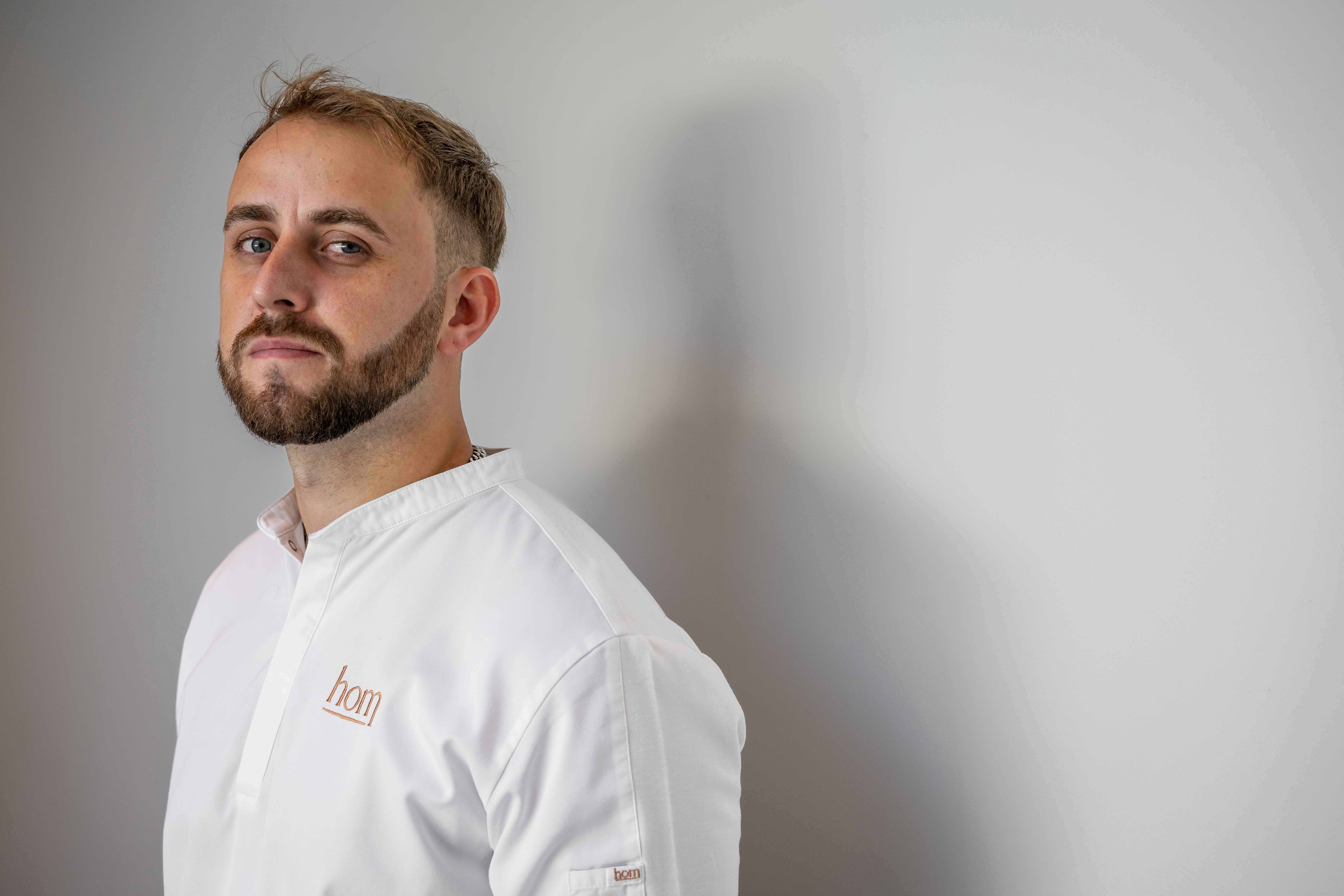


How does locally sourced produce compare to those you’d typically get overseas, and which of these products excites you the most when working with it?
hom takes great pride in being a produce-first concept, with a strong commitment to sourcing ingredients locally from Phuket. Locally sourced produce offers a unique advantage over those typically obtained from Europe or Japan. The diversity and abundance of ingredients available in Phuket create an exciting playground for culinary experimentation.
What excites us the most when working with locally sourced produce are the rich flavors and vibrant characteristics unique to the region. Phuket's tropical climate and fertile soil contribute to the exceptional quality of fruits, vegetables, and herbs, allowing us to showcase the best of what the island has to offer.
Furthermore, building close relationships with local farmers and suppliers has given us access to seasonal delights that might not be as readily available in other regions. The element of surprise and discovery that comes with working closely with local producers fuels our creativity and inspires us to create dishes that truly embody the essence of Phuket's culinary landscape.
What is your goal for hom? How do you see the concept evolving in the next few years?
Our goal for hom is to offer an unforgettable dining experience that celebrates local produce and embraces culinary experimentation through fermentation. As we continue our culinary journey, we envision hom becoming a beacon of creativity in Phuket's gastronomic landscape. Our vision is to further strengthen our relationships with local farmers, forage for more unique ingredients, and push the boundaries of fermentation techniques. We aspire to surprise and delight our guests with constantly evolving menus, showcasing the best of local flavors with innovative twists, making it a go-to spot for an unparalleled fine dining experience in Phuket.










 Back
Back
